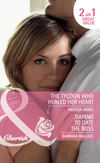Buch lesen: «Their Christmas Miracle»
Lost: One wife and mother.
Found: Their forever family?
Finding the wife he’d believed was lost to him forever in a remote Scottish village seems like a miracle to wealthy CEO Thomas Collier. Rosalind is suffering from amnesia—she can’t remember anything from before her accident, including her husband and their daughter! As Christmas draws near, back in their London penthouse, can Thomas help Rosalind regain her past and embrace the loving future they all deserve?
BARBARA WALLACE can’t remember when she wasn’t dreaming up love stories in her head, so writing romances for Mills & Boon is a dream come true. Happily married to her own Prince Charming, she lives in New England, with a house full of empty-nest animals. Occasionally her son comes home as well! To stay up to date on Barbara’s news and releases sign up for her newsletter at barbarawallace.com.
Also by Barbara Wallace
Saved by the CEO
Christmas with Her Millionaire Boss
In Love with the Boss miniseries
A Millionaire for Cinderella
Beauty & Her Billionaire Boss
Royal House of Corinthia miniseries
Christmas Baby for the Princess
Winter Wedding for the Prince
Discover more at millsandboon.co.uk.
Their Christmas Miracle
Barbara Wallace

ISBN: 978-1-474-07832-0
THEIR CHRISTMAS MIRACLE
© 2018 Barbara Wallace
Published in Great Britain 2018
by Mills & Boon, an imprint of HarperCollinsPublishers 1 London Bridge Street, London, SE1 9GF
All rights reserved including the right of reproduction in whole or in part in any form. This edition is published by arrangement with Harlequin Books S.A.
This is a work of fiction. Names, characters, places, locations and incidents are purely fictional and bear no relationship to any real life individuals, living or dead, or to any actual places, business establishments, locations, events or incidents. Any resemblance is entirely coincidental.
By payment of the required fees, you are granted the non-exclusive, non-transferable right and licence to download and install this e-book on your personal computer, tablet computer, smart phone or other electronic reading device only (each a “Licensed Device”) and to access, display and read the text of this e-book on-screen on your Licensed Device. Except to the extent any of these acts shall be permitted pursuant to any mandatory provision of applicable law but no further, no part of this e-book or its text or images may be reproduced, transmitted, distributed, translated, converted or adapted for use on another file format, communicated to the public, downloaded, decompiled, reverse engineered, or stored in or introduced into any information storage and retrieval system, in any form or by any means, whether electronic or mechanical, now known or hereinafter invented, without the express written permission of publisher.
® and ™ are trademarks owned and used by the trademark owner and/or its licensee. Trademarks marked with ® are registered with the United Kingdom Patent Office and/or the Office for Harmonisation in the Internal Market and in other countries.
Life has a way of exploding sometimes, especially
when you’re on a deadline for a book.
Thank you to all the people who held my hand,
gave me pep talks, and put up with my insanity,
especially Peter, who didn’t see his wife for nights
on end, and my ledge buddy, Donna.
Contents
Cover
Back Cover Text
About the Author
Booklist
Title Page
Copyright
Dedication
CHAPTER ONE
CHAPTER TWO
CHAPTER THREE
CHAPTER FOUR
CHAPTER FIVE
CHAPTER SIX
CHAPTER SEVEN
CHAPTER EIGHT
CHAPTER NINE
CHAPTER TEN
CHAPTER ELEVEN
CHAPTER TWELVE
CHAPTER THIRTEEN
Extract
About the Publisher
CHAPTER ONE
“ADMIT IT. WE’RE LOST.”
Thomas Collier glowered at his baby brother who had been frowning and tapping the GPS screen for the past twenty minutes. “You lured me up to the Arctic, and now we’re lost in a storm.”
“First of all, we’re in the Highlands, not the North Pole.” Linus Collier offered a glower of his own. “Second, we wouldn’t be this far north if you weren’t so particular about your subcontractors. And third, we’re not lost. The GPS froze and won’t tell me if we’re on the correct road.”
What a surprise. They hadn’t gotten a decent signal all day. “In other words, we’re lost.” He knew he should have hired them a driver. They wouldn’t get home until New Year’s at this rate.
A cold December rain pelted the windshield almost as quickly as the wipers could push it away. There was fog too, as thick as anything London could produce. There was no way they could see if they were driving in the right direction.
Thomas leaned forward and turned up the thermostat. The dampness had settled into his bones, leaving a chill that was going to take days to shake. He was cold, cranky and 100 percent needed a drink. Instead he was roaming the Scottish countryside.
“I’m going to be late for bedtime stories,” he grumbled.
“Maddie will understand.”
Understanding didn’t make it right. “I haven’t missed a bedtime in five months.” Even if he did go back to work immediately after. The last thing he wanted was for his daughter to think he chose work over her. Ever. It was bad enough knowing that had been one of her mother’s final thoughts. “It’s important she knows she can depend on my being there for her.”
A hand clapped his forearm. “She knows, Thomas.”
“Does she? She’s barely five years old. Six months ago she trusted her mother would be home too.”
He watched the wipers moving back and forth, sweeping away the streaks of rain. Ahead, the narrow road disappeared into the black. “She still wakes up calling for Rosalind in the middle of the night, you know.” Less frequently than she had in those months immediately after the accident, but often enough.
Those cries cut him to the quick. “A child shouldn’t have to grow up without her mother,” he said.
At least half a dozen times a day, Maddie would do something that would have him turning to share a smile, only to realize there was no one there with whom to share it.
“Did you know that the other day, she asked me to help her write to Santa and ask if he would talk to heaven about letting Rosalind visit for Christmas?”
“Yikes.” Linus sucked in air through his teeth. “What did you tell her?”
“Something about Santa already knowing her wish and Rosalind being with us even though she’s invisible. Wasn’t my best moment.”
“I’m sure you handled the moment just fine.”
“Be better if I didn’t have to handle the question at all,” Thomas said with a sigh. If he had stopped Rosalind from driving north that weekend. If he’d been a better husband. He could fill the past nearly two years with ifs.
Woe is the man who tries to serve two loves. You’d think he’d have learned from past generations that Colliers could either run the family company or maintain a successful marriage, but not both. They’d sold that right for two centuries worth of fiscal success and a royal warrant. Honestly, it was lucky their family had survived for two centuries. If Rosalind were alive, she would agree.
But she wasn’t, and he’d never have the chance to show her he’d learned his lesson.
“I think I see something,” Linus said, pointing.
Up ahead a signpost took shape in the fog. “‘Lochmara, Five Miles,’” Thomas read. “Town this far remote has to have a gas station. We could ask for directions.”
“Doesn’t look like we have to drive that far. Look.” The road had taken a sharp turn, and there was a building ahead with floodlights lining the parking lot. As they drew closer, they saw a wooden sign that read McKringle’s Pub swinging in the wind.
“Who on earth would build a pub all the way out here? There isn’t a soul around,” Thomas noted. The parking lot was empty except for a bright red truck.
“Does it matter? They’re open. We can get directions and something to eat. I’m starving.”
“You’re always starving.”
“Because my brother insists on working through the day without a break.”
Thomas sighed. Might as well let Linus have his dinner. It was already too late to make story time. If the building had any decent kind of reception, he could call Maddie and say good-night over the phone.
If the place had a phone. The outside looked like an ancient icehouse, left over from some old estate. Its gray façade looked bleak and cold. Other than the parking lot, the only light came from slivers peeking through the shuttered windows.
“Looks promising,” Thomas said.
“Stop being irritable. It’s a pub, which means it serves food, and, at this point, I’m hungry enough to eat a giant serving of haggis.”
“Now, that I’d like to see.”
At least the front door looked freshly painted, the red brighter and glossier than the shutters. On it hung a giant wreath adorned with tiny Scottish flags.
“Probably from Saint Andrew’s Day,” Linus said.
No surprise there. Considering Scotland’s patron saint began as a fisherman, Thomas imagined the small coastal villages took great pride in marking the celebration of Scottish heritage. He pulled the front handle, opening the door and releasing a blade of bright light.
“Ha!” Linus replied.
Thomas stepped inside and felt his heart seize up.
The restaurant was a little slice of home. Candlelight danced from tea lights around the room, and soft holiday music floated through the air. To the left of the entrance, in what looked like the main dining room, there was a roaring fire. Seeing the greenery placed along the mantle, Thomas ached with memories of branches strewn across another mantle and a brunette curled up in an overstuffed chair.
The setting was too similar. Too much. No way could he stay there without losing his mind.
He was about to tell Linus when a man emerged from the back shadows of the bar.
“Welcome to McKringle’s,” the man greeted in a booming brogue. “I’m Christopher McKringle.”
A barrel-chested man with a bulbous nose and neatly trimmed beard, he clapped both their backs with a beefy hand as if greeting a pair of old friends.
“Collier, eh?” he said upon introduction. “Like the soap.”
“Um, exactly,” Thomas replied.
It was a frequent remark whenever someone heard their name, Collier’s Soap once having been a royal favorite. Usually he would go on to make some kind of proud confirmation, but he was distracted. McKringle looked like such a down-to-earth sort with his flannel shirt and wool fisherman’s sweater. How could he rob the man of the only business they would probably have that night?
“My wife, Jessica, has always been partial to their lemon soap. Claims it washes away the fishy smell better than any other,” McKringle said. “As you can see, we’re just open, so go ahead and take a seat anywhere you like. Our waitress, Maddie, will be out to take your order in just a moment.”
“You all right?” Linus asked, taking Thomas’s coat for him. “Usually you wax on for a good two or three minutes about the company’s heritage.”
“I—I’m fine. The place reminds me... Never mind.” He was being foolish. The more he looked around, the more he realized the restaurant looked nothing like the cottage in Cumbria. His melancholy was playing tricks with his imagination. “Did our host really say his name was Chris McKringle?”
“Yeah,” Linus replied, settling into one of the thick oak chairs by the fire. “Maybe we’re at the North Pole after all. Although, if we are, Mrs Claus knows how to make more than cookies. Check out this menu.”
“After I check in with Maddie.” The screen on his phone indicated zero service. “Dammit. What is it about this place and decent cellular service?”
“Will you relax? Maddie’s in good hands. Nothing’s going to happen.”
“If I’m going to miss stories, the least I can do is call and wish her good-night. And, no, I’m not being obsessive.”
“Didn’t say you were.”
“No, but I could hear you thinking it.” It was probably the stone walls blocking what little signal existed. “I also wanted to see if Mohammed got back with those revised production figures. If we’re going to use your soap factory, we need to know exactly what kind of numbers they can anticipate.”
That was the final piece of his crankiness. Literally everything was riding on this new organic line. If it failed, Collier’s as Britain knew it would cease to exist.
Thinking if he stared at his phone enough he might force a signal, Thomas pushed to his feet. There had to be some way he could get better reception. “I’m going to see if the signal is stronger by the window. If the waitress comes, order me a—”
“Can I get you lads something to drink?”
Thomas’s breath caught. It happened every so often. He’d catch the hint of an inflection or the turn of a head, and his mind would trip up. This time, it was the waitress’s sharp northern twang that sounded uncannily familiar. He looked up, expecting reality to slap him back to his senses the way it had with his cottage memories. Instead...
He dropped the phone.
What the...?
His eyes darted to Linus. His brother’s pale expression mirrored how Thomas felt. Mouth agape, eyes wide. If Thomas had gone mad, then his brother had plunged down the rabbit hole with him. And mad he had to be, he thought, looking back at the waitress.
How else to explain why he was staring at the face of his dead wife?
CHAPTER TWO
“ROSIE?” THE WORD came out as a hoarse whisper; he could barely speak. Six months. Praying and searching. Mourning.
It couldn’t be her.
Who else would have those brown eyes? Dark and rich, like liquid gemstones. Bee-stung lips. And the scar on the bridge of her nose. The one she always hated and that he loved because it connected the smattering of freckles.
How...? When? A million questions swirled in his head, none of which mattered. Not when a miracle was standing in front of him.
“Rosie.” Wrapping her in his arms, he buried his face in the crook of her neck. She smelled of lemons and sunshine. “Rosie, Rosie, Rosie.” He murmured her name against her skin.
Hands slid up his torso to grip his lapels. He moved to pull her closer, only to have her fists push him away.
He found himself staring into eyes blazing with outrage, confusion and panic. The last one squeezed at his heart.
“Do I know you?” she asked.
Was this some kind of joke? Now he was confused. Why would she pretend? “They told us you were dead. That—that you were swept out to sea.” He reached for her again, only to have her take another step back.
“I’m sorry. I don’t...” She shook her head, her eyes growing moist with tears. “I don’t know...” Pressing a fist to her mouth, she turned and bolted from the room.
“Rosalind!” Thomas started after her, only to have Linus grab his arm. What the hell was his brother doing? He tried to yank his arm free, but Linus had a grip of iron. His brother’s fingers were dug in so tightly they were going to leave bruises. “Let me go!” he snarled. “It’s Rosalind.” If he lost her again...
But Linus held fast, damn him. “Calm down, Thomas. She only looks like Rosalind.”
“No.” Linus was wrong. It was Rosalind. He knew his wife. Why did she run? Did she hate him that much? “I have to talk with her.”
Before he could try and pull free, McKringle barreled his way over. “What’s going on here?” he asked, all his earlier friendliness stripped away. “I don’t know what you lads do wherever you’re from, but here we don’t manhandle waitresses and make them cry.”
Thomas spun around on him. “And what about hiding someone’s wife from him? Are they okay with that here?”
He waited as McKringle’s bushy brows pulled together. “Did you say ‘your wife’?”
“Rosalind Collier.” Where was his phone? Looking around, he found it on the floor by his chair where he snatched it up and quickly began scrolling through its photo collection. “Here,” he said, finding the photo they’d used for the missing person poster. He held the phone so McKringle could see. His hand was shaking. “She went missing this summer when her car went off a bridge near Fort William.”
Wordlessly, McKringle slipped the phone from his hand and held it closer. Thomas could feel his body tensing with each second of silence. Surely, the man knew what he was talking about. Her disappearance had been all over the news, for crying out loud. They weren’t so isolated out here that he couldn’t have seen at least one headline.
“She had a car accident?” the man finally said.
“Yes. Her car plunged into the river.” Thomas didn’t have time for this. His wife was in the other room. He needed to see her. Find out what happened. How she’d ended up out here and why she was pretending he was some kind of stranger. “Please,” he said. Desperation cracked his voice. “They told us she was dead. I have to talk to her. Need to know what happened. She... We have a daughter who needs her.” His control was starting to slip. Six months of pain rose back to the surface in a groan.
“It’s all right, lad. I think you need to sit down.”
McKringle tried to lead him back to the table, but again Thomas broke from the contact. “Dammit, why is everyone trying to keep me from seeing my wife?”
“We don’t know if it is Rosalind,” Linus said. “I think we should hear him out.”
“I promise you she’s not going anywhere,” McKringle said. “But there’re a few things I think you ought to know. Please, Mr Collier. Take a seat. I’ll get you a drink.”
Thomas didn’t want a drink. He wanted his wife, but he allowed himself to be led back to his chair. Something in McKringle’s eyes said he needed to do as the man said.
“Let me ask you a question,” the old man said once they’d all settled in their seats. “Have you ever heard of the term dissociative fugue?”
She couldn’t stop shaking. Hunched over the bathroom sink, her fingers clutching the vanity edge for support, she could feel her legs trembling beneath her.
Rosie. He’d called her Rosie.
She’d always thought that when she met someone from her past, she would know. Instinct would kick loose whatever it was wrapping her brain in blackness and the memories would be set free. But when this man—this stranger—called her Rosie, she’d felt nothing.
Well, not completely nothing. Her heart had practically beat itself out of her chest when he hugged her. But he could have called her Jane or Susan or Philetta for all the name meant.
Maybe he had her confused with someone else. That must be the answer. What woman could forget a man that devastatingly handsome? Those eyes, blue-gray like the northern sea. If she closed her eyes, she saw them clear as day. Surely, such an indelible couldn’t be wiped from her mind.
She looked in the mirror and studied the heart-shaped face that was familiar yet foreign. Dissociative fugue, the doctor at the hospital called it. A type of amnesia brought on by trauma. All she knew was...nothing. Her mind was a void of memories older than a few months.
At first the blankness had terrified her, but lately she’d started to grow comfortable with her empty past. Until the stranger with blue-gray eyes had walked in.
There was knock on the ladies room door. “Lammie?” Chris’s gentle voice sounded on the other side. “You doin’ all right?”
She warmed at the tender nickname, a term Chris used because he said she was a little lost lamb. “I’m fine,” she replied. “A little shaken up, is all.”
Hearing his voice made her feel better. Chris would keep her safe; he’d been keeping her safe since the day she’d stumbled into his headlights.
“Do you feel up to stepping outside? We’d like to have a chat.”
By “we,” she prayed he meant him and his wife, Jessica, not the stranger with the unnervingly warm embrace.
“I’ll be right out,” she told him.
Ignoring how badly her hands were trembling, she retied her ponytail and wiped the smudges from under her eyes. If she did have to face the stranger again, she was going to look composed, dammit. For some reason it was important he see her pulled together.
When she finally opened the door, she found Chris leaning against the bar. “Better, Lammie?” he asked in a low voice. She nodded, and he gave her an encouraging smile.
She didn’t have to look to know who the other half of “we” was. The man’s presence hung in the air.
“This is Thomas Collier,” Chris said, “and his brother, Linus.”
“Like the soap.” The comment was automatic. A bottle of Collier’s lemon soap sat by the sink in the restaurant’s kitchen. Jessica swore by it, and she’d developed an immediate fondness herself.
“That’s right. They’re up from London.”
She looked to her left where both men sat at a nearby table. Both men were far more subdued this time around. The stranger was perched on the edge of his seat, his lanky body resembling a coil fighting not to spring. “Mr Collier’s wife, Rosalind, is missing,” Chris continued. “She disappeared following a car accident. He’s pretty sure she’s you.”
He’d called her Rosie.
Hoping that if she focused hard enough she might conjure up some spark of recognition, she took a better look at her so-called husband. When she’d first approached their table, before the craziness started, she’d thought both men attractive. Upon second take, she amended her opinion. One was attractive. Thomas Collier was handsome as sin. If they were married, she had fantastic taste. Taller and lankier than his companion, he had the kind of features that separately were nondescript but together formed an arresting picture of angles and slopes. And again, there were those eyes. She could almost imagine white caps dotting their blue-gray depths. A slow whorl of awareness unexpectedly twisted through her midsection.
Attraction aside, however, she might as well have been admiring a stranger. “I told him about your condition,” Chris told her.
“And you believe him?” A moot question if ever there was one. Chris wouldn’t have asked her to join them if he didn’t think Collier’s claims had merit.
“Think it’s worth you hearing him out,” Chris said. “Then you can decide for yourself.”
She chewed her lip, unsure what to do. On the one hand, if this man’s story turned out to be true, she’d finally have the answers she’d been seeking. On the other hand, everything she did know would be turned upside down, and while she didn’t know her past, her present was a good one.
“I promise I’ll behave myself,” Collier said. “You have my word I won’t do anything to frighten you again. Please,” he added, gesturing to the seat next to him.
Damn those eyes. How could she say no when they were imploring her?
Chris’s whiskers brushed her ear as he leaned close. “No need to worry, Lammie. I’ll be right over here at the bar if you need anything,” he murmured, before adding in a louder voice, “Mr Collier, might I interest you in something to eat?”
“Don’t have to ask me twice. I’ll take a giant Scotch, as well.” The other man, who she’d already noted was a younger, less arresting version of her “husband,” rose to his feet. As he headed past, he stopped to offer a warm smile. “I can’t believe it’s really you, Rosalind. Thomas is right—it’s a miracle.”
“Come along, Mr Collier. Let me pour you the best double malt in the Highlands.” Taking him by the elbow, Chris led the man to the far end of the bar.
Leaving the two of them alone.
Cautiously, she slipped into the seat to his right, her hands curling over the ends of the chair arms. Jessica was always complaining that the pub tables lacked sufficient leg room underneath, and now she could see why. Her knees and Collier’s were close enough that if she shifted in just the right way, their knees would touch. As it was, she could feel the proximity through her jeans. She scooted her chair backward another couple of inches, and waited.
“I’m sorry about before,” Collier said. “I didn’t mean to frighten you. When I saw you, I couldn’t...” He paused and took a deep breath. “We were told you were dead. That you had most likely drowned in the river.”
River. She squeezed the chair arms as recollections of her nightmares came to mind. Flashes of pitch-black water and air being sucked from her lungs. She had to take a deep breath herself as a reminder the image wasn’t real.
Even so, her voice still came out strangled and hoarse. “Chris told you about my memory?”
“He said you can’t remember anything before the past four months.”
“That’s right. The doctors at the hospital think I suffered a traumatic event that caused my memory to shut itself off.” Traumatic event being the term they settled on after their battery of tests failed to turn up anything else. “You said your wife was in a car accident.”
“There was a bridge collapse and your car—” she noticed he was already using the second person “—was plunged into the River Lochy during a heavy storm.”
Plunging into icy waters certainly qualified as traumatic and would explain her nightmares. Then again, drowning in dreams was also a well-established metaphor, or so she was pretty sure. “I had a broken collarbone,” she said out loud.
“I’m surprised you didn’t break more.”
Again with the second person. “You seem awfully positive I’m her. Your wife, I mean.”
“Because I’d know you anywhere.”
The way Collier looked her in the eye, with both his voice and his expression softening, knocked her off-balance. Here she was groping around in the dark, and he was looking at her with such certainty. Like he’d found a treasure while she was still trying to figure out the map. It left her longing to see what he saw.
“You say you know, but I would be a fool to simply take you at your word.” Or be misled by a pair of stormy blue eyes.
“Trust me, Rosie, the last thing I’d ever call you is a fool. I have photos.” He pulled out a phone and showed her a photograph.
Of her.
If it wasn’t her, it was her perfectly identical twin.
“There are more.” He swiped to another photo, this time a more sophisticated version of the same woman, with her hair in a twist and wearing a stunning black gown.
“The museum fund-raiser last May,” he said. “You looked beautiful in that dress.”
What she looked was unhappy. Her smile didn’t reach her eyes.
The next picture must have been taken the same evening, only this time her doppelganger was flanked by a woman with flaming red hair and a handsome older man with shaggy graying hair and spectacles.
“Those are your colleagues from the university. Eve Cunningham and Professor Richard Sinclair.”
She couldn’t help noticing the firm way the professor held his arm around her waist.
“You’re not in these photos.” She rubbed her forehead. A throbbing sensation started behind her eye.
“That’s because I took them.”
And they were on his phone. “Is there one of us together?” Anyone could get random photos from any number of sources. It would be harder, although not impossible, to fake a photo of both of them.
“A few.” Seconds later, she was looking at a selfie—and a terrible one at that, with looming faces and the tops of the heads cropped off. No mistaking her face though, right down to the annoying scar across the bridge of her nose.
Unlike the other photographs, their smiles reflected in their eyes.
“We took this two springs ago, when we were in the Lake District,” Thomas told her.
“Two springs ago? Nothing more recent?”
“I’m not much of a selfie taker.”
That was obvious. She studied the photograph closer. “We look happy.”
We. She was starting to believe him. Rosalind Collier. The name sounded strange, but had a comfortable feeling. The way a new outfit felt when it fit properly.
Thomas took back the phone and stared at the photo. “We were,” he said. “Happy. You loved being at our place in Cumbria, away from the city.”
Then why did his voice suddenly sound sad? Why was he staring at the picture with a pensive expression?
“You were supposed to be in Cumbria when you had your accident,” he murmured.
Oh. That was why. A wisp of a thought taunted her, hovering just out of her grasp. Something about ice or rocks, but it slipped back into the blackness before she could be certain.
She was certain of another thought however. “If I was supposed to be in the Lake District, how did I end up here, miles away? Fort William is miles away from Cumbria too. What was I doing there? It doesn’t make sense.”
“No one knows.” He tossed the camera onto the table where it landed with a thunk. “Best theory I can come up with is that you were headed toward Loch Morar. You did some field work there once. You’re a geologist,” he added when she frowned.
“Geomorphological features.” The words popped out of her mouth without her thinking. Thomas’s eyes widened in response.
“Exactly,” he said. “You did a paper on the glacier marks.”
She slipped a step closer to accepting his tale. As it was, the name Rosalind was already taking hold in her brain.
“What we don’t understand,” he said, “is how you got here. We searched for weeks and everyone was certain you’d been washed into the Atlantic. How did you end up here in the northeast corner?”
Der kostenlose Auszug ist beendet.



















